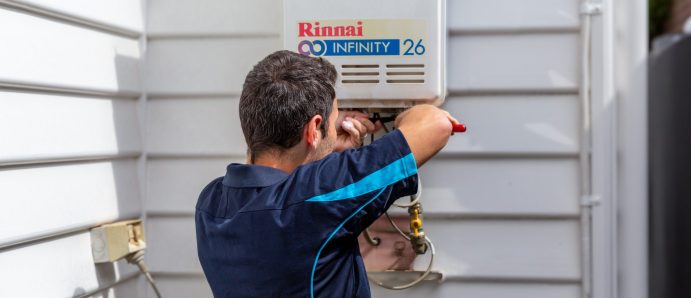The market is flooded with all sorts of different types of HWU, this has positive and negative effects on our industry. On the positive side, this has created competition between companies, meaning that two or three brands don’t hold a monopoly on HWU.
It has driven these companies to see how they can improve their existing systems and look to the future for how they can grow i.e. new styles of hot water units.
There are five main types of HWU being used in Melbourne (not to say there are not others in use, but the following is what is commonly found).
Gas storage HWU
A few companies make different types of Gas storage HWUs ranging in differing sizes to suit your needs. These are popular due to their affordability but have flaws in comparison to other units.
- As this type of unit stores water in a cylinder and then heats up regularly like a kettle, they tend to split with no repair possible of the split cylinder. These should be serviced every 5 years, and the pressure-temperature relief valve pulled every 6 months and replaced every 5 years.
- As water is held in the tank or cylinder, the water must stay at a temperature above 60 degrees to ward off any legionnaire’s disease growing in the tank, this high-temperature water can burn younger or elderly people (There are added valves we can install called tempering valves which tempers the hot water with cold to create a lesser temp coming out of taps).
- Once you have used the full amount of water the unit can hold, there is a wait time of approximately 2 hours until hot water is then available to use.
Electric storage HWU
Again, there are a few different brands of HWU. They work similarly to the above-mentioned HWUs with the difference of the water being heated by electricity, these tend to be a little more expensive to purchase and install but if you have solar panels the cost may be offset over time. There are some negatives that their gas-powered cousin does not have.
- An electrician and plumber are required to install the unit
- There are twin element or single element units, if single these will heat in off-peak times (meaning it costs you less to heat the water), they heat during the night and cool off a little by the afternoon and once it has run out there will be no more water until it runs its cycle again the next night. If you have twin elements, these heat in the off-peak time but have a boost button to allow the unit to heat during peak time to allow hot water into your home, although heating this during peak times can be costly.
Solar HWU with booster
If you have built or purchased a home from a building company (eg. house and land package) this is generally where you would find these. The units themselves can be hit and miss depending on what brand you get but all operate similarly, where the water goes through the panels and heats (the temp of this water can be very hot) then goes back and sits in the storage tank (like the above HWU’s). As we don’t always have the sun to charge the panels and heat the water there is also a gas booster which the water will run through before coming out of your tap. If the water is not hot enough it will start the gas unit (continuous flow) and provide water at the appropriate temperature. Again, there are some positives and flaws in this system.
- No sun, no free hot water
- On very cold mornings as the hot water runs through the solar panels which are made of glass, these can crack and cause a leak. To fix this you will need a replacement of the solar panel or bypass the solar unit and rely only on the gas continuous flow
- Builders generally install these to get a higher star rating on their build with no major benefit to the client (if you lived up north this may be different but not so much down in the southern states)
- An electrician and plumber are required to install
- Can get cheap units which underperform
Continuous flow HWU
These are very good units and do what is stated. They continuously produce hot water as you need it and are affordable. No storing heated water and minimal wait time to receive the hot water meaning no gas or electricity is used when hot water is not required.
As you turn your hot tap on, the continuous flow HWU draws water through the unit and electronically fires up (powerpoint on the wall), then cold water passes through a radiator-type pipe being heated as the water passes through. These can be at 60 degrees or more modern ones at 50 degrees. When you turn your tap off the unit recognises this and stops, meaning you will use less gas over the life of the unit.
- Slightly higher cost to install (compared to gas storage unit) although it will pay for itself in time
- If you have no power the unit will not start up and heat the water
- Is a little more work to install, especially if you have an existing unit that is different
Heat Pump HWU
These are the newest types of HWU on the market and are the most efficient out of the lot. They connect to the power of the property (perfect for solar panels) to finish the heating process, but to start the process it draws air from the surrounding area, as the air runs through the unit it mixes with a gas which heats up and runs through the cylinder heating the water in the cylinder. The Australian government have been pushing for these to become more popular due to the benefits to the environment by providing a rebate to replace existing HWUs with one of these and in some circumstances may end up being free.
This is the most cost-efficient way of creating hot water and if powered via solar panels you will essentially be getting hot water at no cost. However, there are downsides;
- These units are a little noisier than what people may be used to
- The units that were given out for free tend to fail within the year and do not perform very well (don’t heat the water well). This is different to other reputable brands, but these cost more, the ‘good’ units were not part of the free upgrade of HWU
- Being so new to the industry, not every plumber has worked on them (compared to the other types mentioned above where nearly every plumber has worked on them multiple times
- Take up more room than other units
- Higher install cost (although provides free hot water for its life if used in conjunction with solar panels)
There are so many things that go into what is the right HWU for you and your family. It can be hard for an untrained person to understand the pros and cons of each type of unit. At O’Shea Plumbing we will spend time with you to give you the information you need to decide which option is best for you. We can give you free obligation-free options on all or one depending on what you require.
If you would like one of the O’Shea Plumbing consultants team to attend, please get in touch with us today on 9888 2887.


